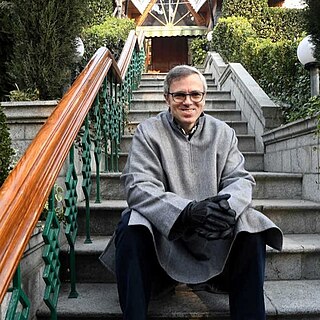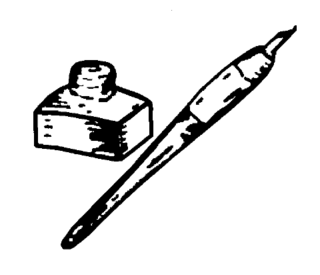
The Bharatiya Janata Party is a political party in India and one of the two major Indian political parties alongside the Indian National Congress. Since 2014, it has been the ruling political party in India under the incumbent Prime Minister Narendra Modi. The BJP is aligned with right-wing politics and has close ideological and organisational links to the Rashtriya Swayamsevak Sangh (RSS) volunteer paramilitary organisation. Its policies adhere to Hindutva, a Hindu nationalist ideology. As of January 2024, it is the country's biggest political party in terms of representation in the Parliament of India as well as state legislatures.

Vishwanath Pratap Singh, shortened to V. P. Singh, was an Indian politician who was the 7th Prime Minister of India from 1989 to 1990 and the 41st Raja Bahadur of Manda.

The Jammu and Kashmir National Conference (JKNC) is a regional political party in Indian-administered Kashmir's union territories of Jammu and Kashmir and Ladakh. Founded as the All Jammu and Kashmir Muslim Conference by Sheikh Abdullah and Chaudhry Ghulam Abbas in 1932 in the princely state of Jammu and Kashmir, the organisation renamed itself to "National Conference" in 1939 in order to represent all the people of the state. It supported the accession of the princely state to India in 1947. Prior to that, in 1941, a group led by Ghulam Abbas broke off from the National Conference and revived the old Muslim Conference. The revived Muslim Conference supported the accession of the princely state to Pakistan and led the movement for Azad Kashmir.

Mehbooba Mufti Sayed is an Indian politician of the PDP, who served as the 9th Chief Minister of Jammu and Kashmir from 4 April 2016 to 19 June 2018. She was the first female chief minister of Jammu and Kashmir. After the revocation of Article 370 of the constitution in August 2019, Mufti was detained without any charges at first and later under the Jammu and Kashmir Public Safety Act.
Armed Forces Act (AFSPA), 1958 is an act of the Parliament of India that grants special powers to the Indian Armed Forces to maintain public order in "disturbed areas". According to the Disturbed Areas Act, 1976 once declared 'disturbed', the area has to maintain status quo for a minimum of 3 months. One such act passed on 11 September 1958 was applicable to the Naga Hills, then part of Assam. In the following decades it spread, one by one, to the other Seven Sister States in India's northeast. Another one passed in 1983 and applicable to Punjab and Chandigarh was withdrawn in 1997, roughly 14 years after it came to force. An act passed in 1990 was applied to Jammu and Kashmir and has been in force since.

Dr. Farooq Abdullah is an Indian politician and current President of Jammu & Kashmir National Conference. He has served as the Chief Minister of Jammu and Kashmir on several occasions since 1982, and as the union minister for New and Renewable Energy between 2009 and 2014. He is the son of the 1st elected Chief Minister of Jammu and Kashmir Sheikh Abdullah, and father of former Chief Minister of Jammu and Kashmir Omar Abdullah.

Omar Abdullah is an Indian politician who served as former Chief Minister of the erstwhile state of Jammu and Kashmir and Chairperson of Jammu and Kashmir National Conference since 2009.

The Jammu and Kashmir Peoples Democratic Party (PDP) is a state political party in Jammu and Kashmir, India. The PDP was headed and founded by Mufti Mohammed Sayeed. His daughter, Mehbooba Mufti, succeeded him as party leader and as Chief Minister of Jammu and Kashmir following his death in January 2016. The party is a member of the People's Alliance for Gupkar Declaration electoral alliance. The party is also a member of the Indian National Developmental Inclusive Alliance since its founding on 18 June 2023.

The Jammu & Kashmir National Panthers Party is a socialist and secular state political party in the state of Jammu and Kashmir, India. The party was founded on 23 March 1982 by husband and wife couple Prof. Bhim Singh and Jay Mala, Its aim is to "demolish corruption, communalism, criminalization, drug menace" and to establish a real democracy through ultimate revolution. Panthers party has maintained power at assembly and local level for over four decades in its stronghold within the mountainous Udhampur constituency, where in the vicinity 5.9 million tonnes of lithium, the 7th largest known reserve in the world, with an estimated value of $500 billion, was discovered in February 2023.

Article 370 of the Indian constitution gave special status to Jammu and Kashmir, a region located in the northern part of the Indian subcontinent and part of the larger region of Kashmir which has been the subject of a dispute between India, Pakistan and China since 1947. Jammu and Kashmir was administered by India as a state from 17 November 1952 to 31 October 2019, and Article 370 conferred on it the power to have a separate constitution, a state flag, and autonomy of internal administration.

Nagaland Lok Sabha constituency is the only Lok Sabha constituency in the Northeastern state of Nagaland.

Karan Singh is an Indian politician and philosopher. He is the titular Maharaja of the princely state of Jammu and Kashmir. From 1952 to 1965 he was the Sadr-i-Riyasat (President) of the state of Jammu and Kashmir. He is the chairperson trustee of the Dharmarth Trust of Jammu and Kashmir which maintains 175 temples in north India and works in other areas such as historical preservation.

General elections were held in India on 20 May, 12 June and 15 June 1991 to elect the members of the 10th Lok Sabha, although they were delayed until 19 February 1992 in Punjab.
The Jammu and Kashmir Legislative Assembly, also known as the Jammu and Kashmir Vidhan Sabha is the legislature of Indian union territory of Jammu and Kashmir.

Elections in the Union Territory of Jammu and Kashmir are conducted in accordance with the Constitution of India to elect the representatives of various bodies at national, state and district levels including the 114 seat unicameral Jammu and Kashmir Legislative Assembly and the Parliament of India. The first elections in the Union Territory of Jammu and Kashmir took place between 28 November and 19 December 2020 in the form of by-elections to District Development Councils and municipal and panchayat level bodies. A fresh delimitation process for assembly constituencies began in February–March 2020.
The Jammu and Kashmir Awami League is a political party in the Indian-administered union territory of Jammu and Kashmir. The party was founded by members of different counter-insurgent groups in November 1995. It supports article 370 of the Indian constitution, granting special status to Jammu and Kashmir. The party argues that the people of Jammu and Kashmir have the right to self-determination within the Indian constitutional framework, but not accession to Pakistan nor independence.

The 1996 Indian general election in Jammu and Kashmir to the 11th Lok Sabha were held for 6 seats. Bharatiya Janata Party won 1 seat, Indian National Congress won 4 seats and Janta Dal won 1 seat.

The 1989 Indian general election in Jammu and Kashmir to the 9th Lok Sabha were held for 6 seats. Indian National Congress won 2 seats, Jammu and Kashmir National Conference won 3 seats and an Independent candidate won 1 seat.

The 1984 Indian general election in Jammu and Kashmir to the 8th Lok Sabha were held for 6 seats. Indian National Congress won 3 seats and Jammu and Kashmir National Conference won 3 seats.

The Jammu and Kashmir Reorganisation Act, 2019 is an act of the parliament of India containing provisions to reconstitute the Indian-administered state of Jammu and Kashmir into two Indian-administered union territories (UTs) called Jammu and Kashmir, and Ladakh, and becoming effective on 31 October 2019. A bill for the act was introduced by the Minister of Home Affairs, Amit Shah, in the Rajya Sabha on 5 August 2019 and was passed on the same day. It was then passed by the Lok Sabha on 6 August 2019 and it received the president's assent on 9 August 2019.















